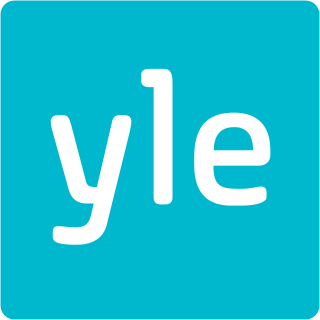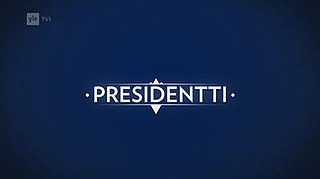
Yleisradio Oy, abbreviated as Yle and translated to English as the Finnish Broadcasting Company, is Finland's national public broadcasting company, founded in 1926. It is a joint-stock company which is 99.98% owned by the Finnish state, and employs around 3,200 people in Finland. Yle shares many of its organizational characteristics with its British counterpart, the BBC, on which it was largely modeled.

MTV3 is a Finnish commercial television channel owned and operated by the media company MTV Oy, originally launched in 13 August 1957 as a programming block and it came to be launched on 1 January 1993 as its own channel. It had the biggest audience share of all Finnish TV channels until Yle TV1 took the lead. MTV is actually stand for Mainos-TV, due to the channel carrying advertising for revenue. Number 3 was added later, when the channel was allocated the third nationwide television channel and it generally became known as "Channel Three"—Finnish Broadcasting Company's Yle TV1 and Yle TV2 being the first two—and also to distinguish it from the later MTV Finland, which is a Finnish version of Paramount's MTV channel. From 1957 until 2001, the channel's logo was a stylised owl, changed to an owl's eye after an image renewal in 2001, which was then used until 2013. MTV3 has about 500 employees. It is also known as Maikkari.
Television was introduced in Finland in 1955. Color television started in 1969 and was introduced gradually, with most programs in color by the late 1970s. All terrestrial analogue stations stopped broadcasting on 1 September 2007 after the introduction of digital television; cable providers were allowed to continue analog broadcasting in their networks until 1 March 2008.

Yle TV1 is a Finnish television channel owned and operated by Finnish public broadcaster Yle. It is the second oldest and the oldest existing television channel in Finland. More than 70% of the channel's programs are documentaries, news, or educational programmes. Its name is commonly referred to as Ykkönen; it derives from Yle's ownership of channels Spots 1 and 2 by default in Finland; the other, spot 2 channel, is Yle TV2.
Finland participated in and won the Eurovision Song Contest 2006 with the song "Hard Rock Hallelujah" written by Mr Lordi. The song was performed by the band Lordi. The Finnish broadcaster Yleisradio (Yle) organised the national final Euroviisut 2006 in order to select the Finnish entry for the 2006 contest in Athens, Greece. 12 artists with two songs each were selected to compete in the national final, which consisted of four semi-finals and a final, taking place in February and March 2006. Twelve entries ultimately competed in the final on 10 March where votes from the public selected "Hard Rock Hallelujah" performed by Lordi as the winner.
Finland participated in the Eurovision Song Contest 2007 with the song "Leave Me Alone" written by Martti Vuorinen and Miikka Huttunen. The song was performed by Hanna Pakarinen. In addition to participating in the contest, the Finnish broadcaster Yleisradio (Yle) also hosted the Eurovision Song Contest after winning the competition in 2006 with the song "Hard Rock Hallelujah" performed by Lordi. Yle organised the national final Euroviisut 2007 in order to select the Finnish entry for the 2007 contest in Helsinki. 12 artists with two songs each were selected to compete in the national final, which consisted of four semi-finals and a final, taking place in January and February 2007. Twelve entries ultimately competed in the final on 17 February where votes from the public selected "Leave Me Alone" performed by Hanna Pakarinen as the winner.

Totuutta ja tehtävää is the fifth album and the first compilation album by Finnish pop rock singer-songwriter Maija Vilkkumaa. It was released by Warner Music in Finland on 8 November 2006 and peaked at number four on its debut week on the Finnish Albums Chart and charted for 15 weeks. The album has sold 25,620 copies to date in Finland, which has granted it a gold certification.
Finland participated in the Eurovision Song Contest 2012 with the song "När jag blundar" written by Jonas Karlsson. The song was performed by Pernilla Karlsson. The Finnish broadcaster Yleisradio (Yle) organised the national final Uuden Musiikin Kilpailu 2012 in order to select the Finnish entry for the 2012 contest in Baku, Azerbaijan. 13 entries were selected to compete in the national final, which consisted of four performance shows and a final, taking place in January and February 2012. Six entries ultimately competed in the final on 25 February where votes from the public selected "När jag blundar" performed by Pernilla Karlsson as the winner.
Finland participated in the Eurovision Song Contest 2013 with the song "Marry Me" written by Krista Siegfrids, Erik Nyholm, Kristofer Karlsson and Jessika Lundström. The song was performed by Krista Siegfrids. The Finnish broadcaster Yleisradio (Yle) organised the national final Uuden Musiikin Kilpailu 2013 in order to select the Finnish entry for the 2013 contest in Malmö, Sweden. 12 entries were selected to compete in the national final, which consisted of two heats, a semi-final and a final, taking place in January and February 2013. Eight entries ultimately competed in the final on 9 February where the 50/50 combination of votes from a four-member judging panel and votes from the public selected "Marry Me" performed by Krista Siegfrids as the winner.
Finland participated in the Eurovision Song Contest 2014 with the song "Something Better" written by Topi Latukka and Henri Oskár. The song was performed by the band Softengine. The Finnish broadcaster Yleisradio (Yle) organised the national final Uuden Musiikin Kilpailu 2014 in order to select the Finnish entry for the 2014 contest in Copenhagen, Denmark. 12 entries were selected to compete in the national final, which consisted of two heats, a semi-final and a final, taking place in January and February 2014. Eight entries ultimately competed in the final on 1 February where the 50/50 combination of votes from a four-member judging panel and votes from the public selected "Something Better" performed by Softengine as the winner.
Finland participated in the Eurovision Song Contest 2015 with the song "Aina mun pitää" written and performed by the band Pertti Kurikan Nimipäivät. The Finnish broadcaster Yleisradio (Yle) organised the national final Uuden Musiikin Kilpailu 2015 in order to select the Finnish entry for the 2015 contest in Vienna, Austria. 18 entries were selected to compete in the national final, which consisted of three semi-finals and a final, taking place in February 2015. Six entries competed in each semi-final and the top three from each semi-final, as selected solely by a public vote, advanced to the final. Nine entries competed in the final on 28 February where the combination of votes from eight jury groups representing different factions of Finnish society and votes from the public selected "Aina mun pitää" performed by Pertti Kurikan Nimipäivät as the winner.
Finland participated in the Eurovision Song Contest 2016 with the song "Sing It Away" written by Sandhja Kuivalainen, Milos Rosas, Heikki Korhonen, Petri Matara and Markus Savijoki. The song was performed by Sandhja. The Finnish broadcaster Yleisradio (Yle) organised the national final Uuden Musiikin Kilpailu 2016 in order to select the Finnish entry for the 2016 contest in Stockholm, Sweden. 18 entries were selected to compete in the national final, which consisted of three semi-finals and a final, taking place in February 2016. Six entries competed in each semi-final and the top three from each semi-final, as selected solely by a public vote, advanced to the final. Nine entries competed in the final on 27 February where the 50/50 combination of votes from ten jury groups representing different factions of Finnish society and votes from the public selected "Sing It Away" performed by Sandhja as the winner.

Sanna Mirella Marin is a Finnish politician who has served as the leader of the Social Democratic Party of Finland (SDP) since 2020. A member of Parliament since 2015, she previously served as prime minister of Finland from 2019 to 2023.

Presidentti is a Finnish political drama series that was broadcast on Yle TV1 from 5 February to 23 April 2017. The series was directed by Lauri Nurkse, written by Kirsti Manninen and Antti Pesonen, and produced by Zodiak Finland.

Laura Huhtasaari is a Finnish politician and teacher. As a member of the Finns Party, she has represented Satakunta in the Parliament of Finland from April 2015 to July 2019. She was the Finns Party candidate for the 2018 Finnish presidential election. In 2019 Huhtasaari was elected to the European Parliament with 92,760 votes
National selections refer to the processes in which the broadcasters of the countries participating in the annual Eurovision Song Contest select the artist and song that will represent them in the contest.
Uuden edessä is a song by Finnish group Toivon Kärki, released on 10 April 2020 through Warner Music Finland. The proceeds of the song were directed to Finnish Red Cross to help people in Finland who have been affected by COVID-19 pandemic. The song was written by Lauri Tähkä and Timo Kiiskinen and produced by Jukka Immonen, Jurek, Antti Riihimäki and Eppu Kosonen.
Finland participated in the Eurovision Song Contest 2021 with the song "Dark Side" written by Aleksi Kaunisvesi, Joonas Porko, Joel Hokka, Niko Moilanen and Olli Matela. The song was performed by the band Blind Channel. The Finnish broadcaster Yleisradio (Yle) organised the national final Uuden Musiikin Kilpailu 2021 in order to select the Finnish entry for the 2021 contest in Rotterdam, Netherlands. Seven entries were selected to compete in the national final on 20 February 2021 where the combination of votes from seven international jury groups and votes from the public selected "Dark Side" performed by Blind Channel as the winner.
Finland participated in the Eurovision Song Contest 2022 in Turin, Italy, with the song "Jezebel" written by Lauri Ylönen and Desmond Child, and performed by The Rasmus. The Finnish broadcaster Yleisradio (Yle) organised the national final Uuden Musiikin Kilpailu2022 in order to select the Finnish entry for the contest. Seven entries were selected to compete in the national final on 26 February 2022, where the combination of votes from seven international jury groups and votes from the public selected the winner.
Finland participated in the Eurovision Song Contest 2023 in Liverpool, United Kingdom, with the song "Cha Cha Cha" performed by Käärijä. The Finnish broadcaster Yleisradio (Yle) organised the national final Uuden Musiikin Kilpailu2023 in order to select the Finnish entry for the contest. Seven entries were selected to compete in the national final on 25 February 2023, where the combination of votes from seven international jury groups and votes from the public selected the winner.






